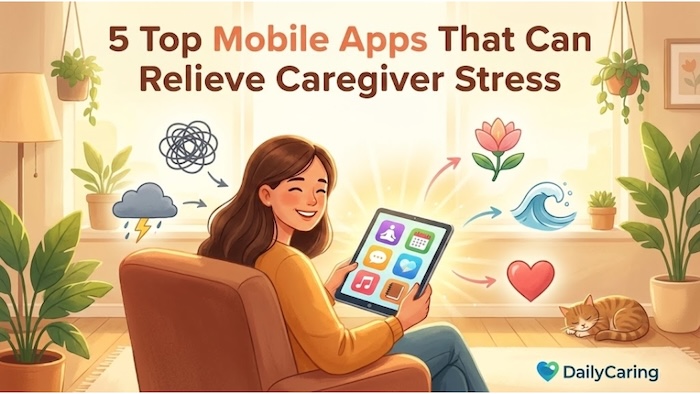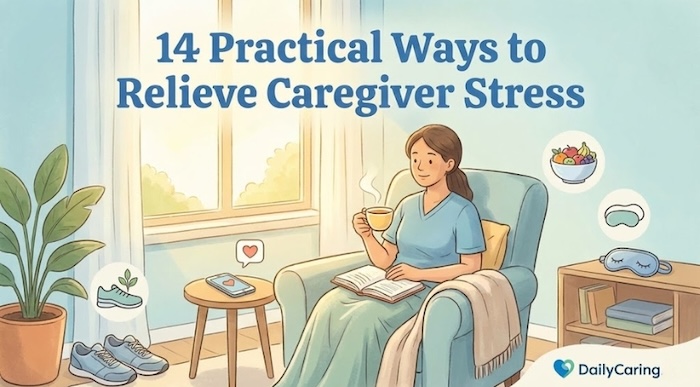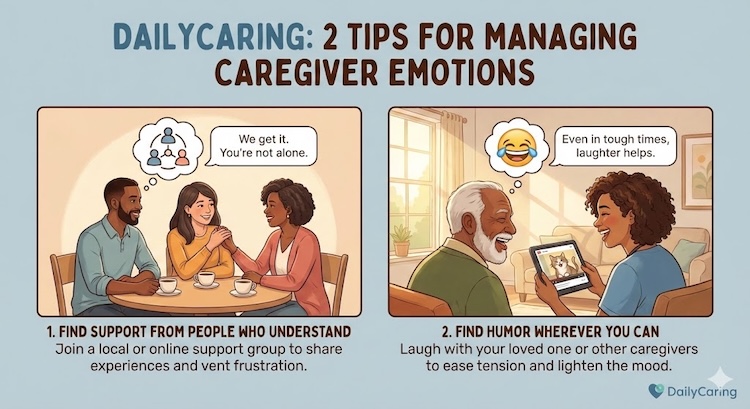How often have you scolded yourself for making a small mistake or not reaching an unrealistic goal? That kind of self-criticism can pile on emotional stress and lead to burnout.
It’s natural to hold yourself to high standards because you want the best for your loved one. However, being overly self-critical can make caregiving even more challenging to sustain in the long run.

To help, psychologist Dr. Kristin Neff, a leading expert on self-compassion, offers free tools to help caregivers be kinder to themselves and reduce stress.
How Self-Compassion Helps Caregivers
Self-compassion means treating yourself with the same understanding and kindness you’d offer a close friend.
Dr. Neff’s research shows that self-compassionate people are less likely to feel anxious, stressed, or depressed. They’re more likely to feel resilient, happy, and hopeful.
Think about how you’d comfort a friend who’s struggling, then imagine offering yourself that same care. It’s a simple shift that can make a big difference.
Self-Compassion Tools for Caregivers
Dr. Neff’s website includes 25 free resources to help you practice self-compassion. They’re divided into 17 guided meditations and eight simple exercises that fit into a busy caregiver’s day.
Guided Meditations
These meditations, ranging from five to twenty-three minutes, are a great way to take short mental breaks. Find a quiet space, press play, and follow the gentle voice that guides you toward calm and awareness.
Self-Compassion Exercises
Self-compassion exercises are simple ways to be kinder to yourself when things feel difficult. They help replace harsh self-criticism with understanding, calm, and emotional balance.
Examples include writing a supportive letter to yourself, taking short self-compassion breaks during stressful moments, or using gentle touch to comfort your body and mind.
Practicing these small acts regularly can ease caregiver stress and improve well-being.
Each of these practical exercises helps you practice kindness toward yourself and ease caregiver stress.
- How would you treat a friend? Reflect on how you’d speak to a friend in need—and then extend that same compassion to yourself.
- Self-compassion break. Pause and regroup when stress feels overwhelming.
- Explore self-compassion through writing. Write a kind, understanding letter to yourself about a challenge or mistake.
- Supportive touch. Simple physical gestures, such as placing your hand over your heart, can evoke feelings of calm and safety.
- Changing your critical self-talk. Notice harsh thoughts and practice shifting them to gentle, supportive ones.
- Keep a self-compassion journal. Spend a few minutes each day writing about difficult moments and how you responded.
- Identifying what you really want. Replace self-criticism with supportive motivation.
- Take care of the caregiver. A reminder that caring for others starts with caring for yourself.
Why This Matters
When you practice self-compassion, you recharge emotionally. You regain patience, calm, and clarity, which are all essential for providing good care.
As Dr. Neff says, “When we give ourselves compassion, we are opening our hearts in a way that can transform our lives.”
Caring for a loved one requires strength, patience, and a compassionate heart. At DailyCaring, we believe caregivers deserve the same compassion they give every day.
These tools are small ways to refill your energy and kindness toward yourself, because when you care for yourself, you can care better for those who depend on you.
Final Thoughts
Remember, self-compassion isn't a luxury—it's the very foundation that allows you to sustain the incredible care you provide. By weaving even one or two of these gentle tools into your routine, you are not being selfish; you are refilling your own well so you can continue to draw from it.
This isn't about adding more to your to-do list, but about transforming your inner dialogue from criticism to kindness. You deserve the same depth of compassion you so freely give to others.
Start small, be patient with yourself, and know that this practice is one of the most sustainable and loving gifts you can offer both yourself and your loved one.
Recommended for you:
- 4 Ways to Reduce Caregiver Stress with Positive Self Talk
- Caregivers Get Speedy Meditation Benefits with 5 Simple Apps
- 15 Affordable Stress Relief Products That Help Caregivers Relax and Unwind
About the Author

Connie is the founder of DailyCaring.com and was a hands-on caregiver for her grandmother for 20 years. (Grandma made it to 101 years old!) She knows how challenging, overwhelming, and all-consuming caring for an older adult can be. She also understands the importance of support, especially in the form of practical solutions, valuable resources, and self-care tips.













